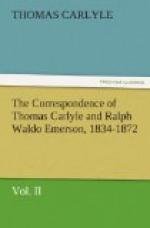I saw Thackeray, in the winter, and he said he would come and see me here, in April or May; but he is still, I believe, in the South and West. Do not believe me for my reticency less hungry for letters. I grieve at the want and loss, and am about writing again, that I may hear from you.
Ever affectionately yours,
R.W.
Emerson
CLIX. Carlyle to Emerson
Chelsea, 20 July, 1856
Dear Emerson;—Welcome was your Letter to me, after the long interval; as welcome as any human Letter could now well be. These many months and years I have been sunk in what disastrous vortexes of foreign wreck you know, till I am fallen sick and almost broken-hearted, and my life (if it were not this one interest, of doing a problem which I see to be impossible, and of smallish value if found doable!) is burdensome and without meaning to me. It is so rarely I hear the voice of a magnanimous Brother Man addressing any word to me: ninety-nine hundredths of the Letters I get are impertinent clutchings of me by the button, concerning which the one business is, How to get handsomely loose again; What to say that shall soonest end the intrusion,—if saying Nothing will not be the best way. Which last I often in my sorrow have recourse to, at what ever known risks. “We must pay our tribute to Time”: ah yes, yes;—and yet I will believe, so long as we continue together in this sphere of things there will always be a potential Letter coming out of New England for me, and the world not fallen irretrievably dumb.—The best




